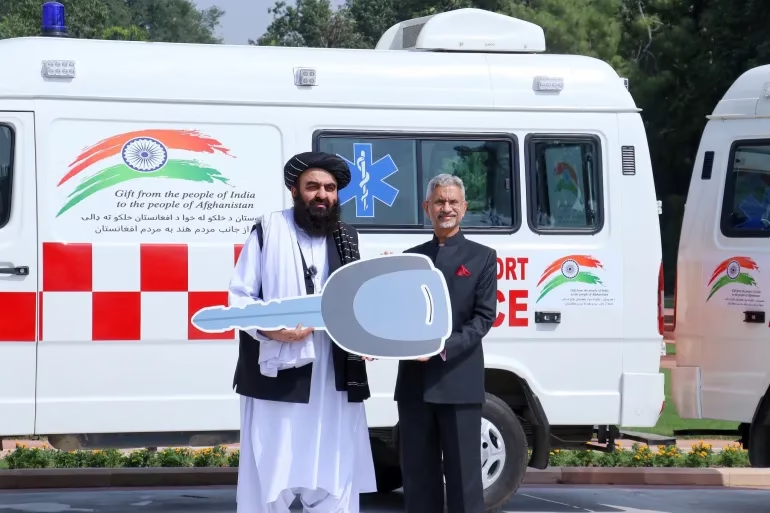New Delhi, India — India has announced plans to upgrade its technical mission in Kabul to a full-fledged embassy, signaling its most significant diplomatic outreach to Afghanistan’s Taliban administration since the group’s takeover in 2021 following the U.S. withdrawal and the fall of the previous government.
Indian Foreign Minister Subrahmanyam Jaishankar made the announcement on Friday after talks with Taliban Foreign Minister Amir Khan Muttaqi in New Delhi, describing the move as a step toward greater regional stability and cooperation.
“Closer cooperation between us contributes to your national development as well as regional stability and resilience,” Jaishankar said at a joint news briefing.
RELATED NEWS : Modi and Starmer Hail UK–India Trade Deal as New Investments Flow In
Jaishankar reaffirmed India’s commitment to Afghanistan’s sovereignty, territorial integrity, and independence, and thanked the Taliban government for inviting Indian companies to explore mining opportunities in the country.
The decision marks the reopening of India’s embassy, which was shut down in 2021 amid the Taliban’s return to power. Since then, New Delhi has operated only a limited technical mission focused on trade, humanitarian aid, and medical support.
Muttaqi welcomed the move, stating that Kabul has always sought good relations with India and assuring that Afghanistan’s territory would not be used for terrorism against other nations.
However, the event stirred controversy when female journalists were barred from attending the press briefing — a restriction reportedly requested by the Taliban delegation. The move drew fresh criticism amid continued crackdowns on women’s rights and education in Afghanistan.
The International Criminal Court (ICC) in July issued arrest warrants for two top Taliban leaders — Supreme Leader Hibatullah Akhundzada and Chief Justice Abdul Hakim Haqqani — on charges of gender-based persecution.
Muttaqi’s visit came after the UN Security Council Committee granted him a temporary travel exemption, as he remains under UN sanctions, including travel bans and asset freezes. The Taliban foreign minister arrived in New Delhi on Thursday, marking a rare high-level visit to India.
While several countries — including China, Russia, Iran, Pakistan, and Turkiye — maintain embassies in Kabul, only Russia has formally recognized the Taliban government.
During the Taliban’s first rule between 1996 and 2001, India refused to engage with the regime, calling it a proxy of Pakistan’s intelligence agencies. Instead, New Delhi supported the Northern Alliance, the main anti-Taliban coalition at the time.
After the U.S.-led intervention in 2001 ousted the Taliban, India reopened its Kabul embassy and became one of Afghanistan’s largest regional development partners, investing over $3 billion in infrastructure, healthcare, and education projects.
In a related development, members of the Moscow Format of Consultations on Afghanistan — which includes India, Pakistan, Russia, China, Iran, and Central Asian nations — released a joint statement opposing any foreign military presence in the country. The statement, issued amid U.S. interest in regaining access to Bagram Airbase, reaffirmed support for Afghanistan as an “independent, united, and peaceful state.”
India’s decision to reopen its embassy underscores a strategic recalibration — balancing humanitarian and security concerns with the reality of Taliban control, as regional powers seek to shape Afghanistan’s post-war trajectory.
SOURCE : AGENCIES | Follow Us: Facebook | Instagram | Twitter | Youtube



